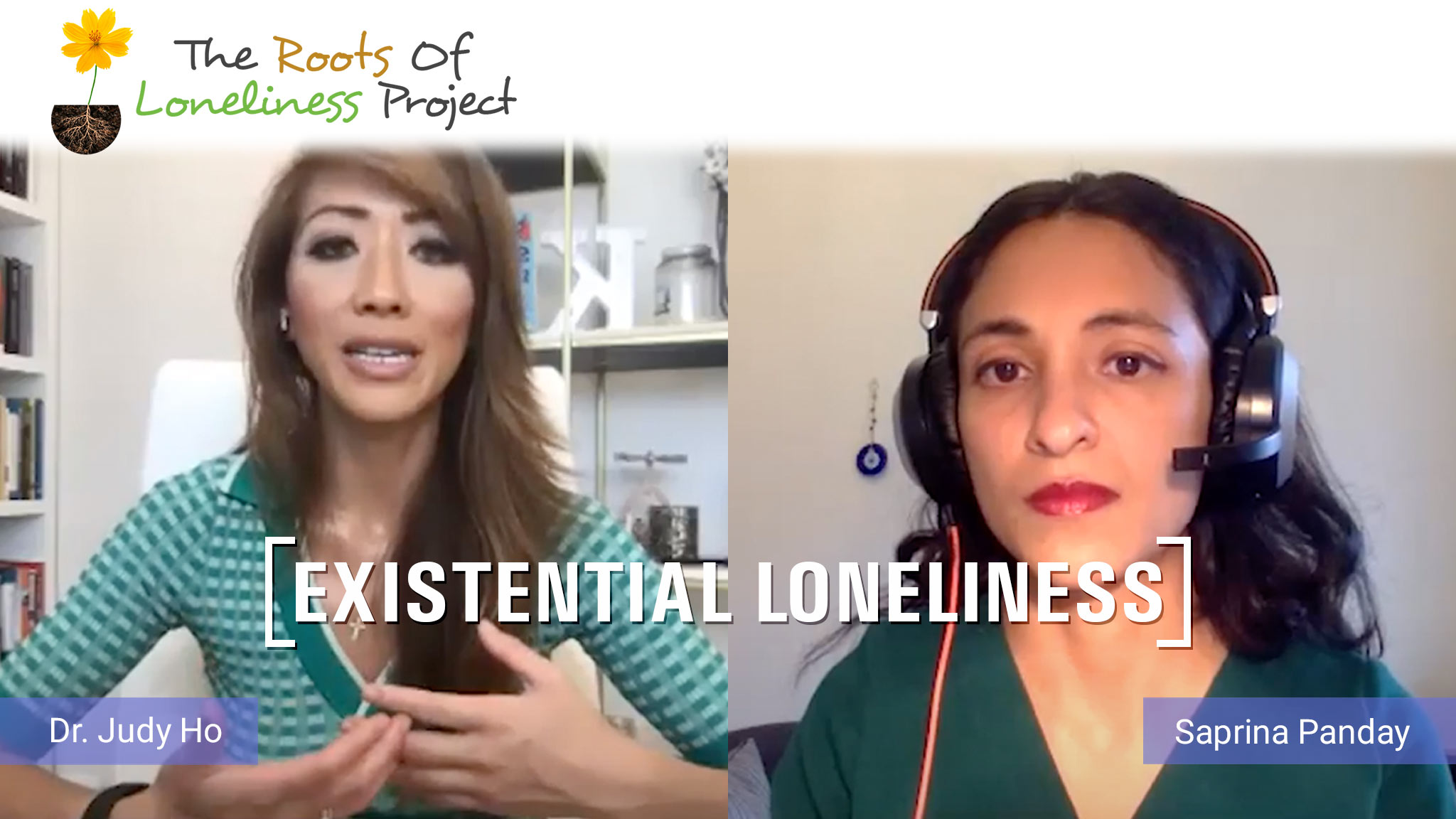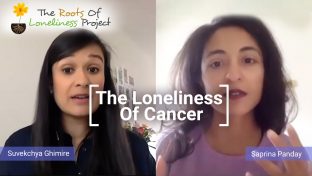Existential Loneliness: Life, Death And Finding Meaning

Let’s be honest: most of us feel lonely at one time or another throughout our lives — for many different reasons.
Like you, I’ve been curious about my loneliness.
Is it normal? Are there others that feel this way? Should I be embarrassed to feel lonely when from the outside, my life seems great?
To learn more about loneliness in all its forms, I’ll speak with experts on our show, “On Loneliness: A Video Series About Coping With Feeling Lonely,” created by The Roots Of Loneliness Project, a first of its kind resource that deeply explores over 100 types of loneliness to help you gain powerful insights and feel less alone.
Editor’s Note: This article is a transcript from “On Loneliness: A Video Series About Coping With Feeling Lonely.” The interview has been edited for length and clarity.
This video is part of our ongoing series The Roots Of Loneliness Project, the first-of-its-kind resource that comprehensively explores the phenomenon of loneliness and over 100 types that we might experience over the course of our lives.
Struggling with loneliness or having a mental health crisis?
- Suicide Prevention Lifeline: 1-800-273-TALK (8255); Deaf or hard of hearing dial 711 before the number or connect via online chat
Saprina: Hi, everybody. I’m Saprina, and in this episode we’re going to be talking about existential loneliness.
You know, that feeling that makes you wonder what’s the meaning of life?
Have you been wasting your life? Is there a bigger purpose than what you’re doing and what you’re living every day?
If you’re feeling that way, don’t worry, because we’re speaking to three incredible experts who will offer guidance on why we’re feeling this way while also giving us tips on how to manage this sometimes paralyzing emotion.
- Dr. Judy Ho is a triple board-certified clinical and forensic neuropsychologist, a tenured professor at Pepperdine University, and the author of the book Stop Self-Sabotage. She’s also the host of the Supercharged Life podcast as well as co-host of The Doctors.
- Saba Harouni Lurie is a licensed marriage and family therapist and board-certified art therapist. She’s a professor at Loyola Marymount University and the owner and founder of Take Root Therapy, a psychotherapy practice located in Los Angeles, California.
- Dr. Ken Lewis is a researcher in transpersonal psychology and studies how non-western ways of knowing interface with modern neuroscience. He is an expert in meditation processes, having spent an extensive amount of time in Buddhist monasteries and Hindu Ashrams.
What Causes Feelings Of Existential Loneliness?
Judy: This type of spiritual loneliness is a type of loneliness that isn’t really cured by having good relationships with other people, being around people that you love.
It’s more the sense of longing. Sometimes, people describe it as even a sense of emptiness, even though they feel surrounded by love, and that’s why it can be confusing for some people.
Ken: The root of loneliness is when you are disconnected from the present moment and instead your connection is to this constant stream of thought, worry, and self-referential thought, which means that you’re just thinking about your own little world.
You start to think that you’re the center of the story, and when you do that, you’re so disconnected from the world around you that you’re going to feel this loneliness.
Saba: So, the way that I understand it, existential loneliness could be considered the feeling of being alone in a grander or cosmic sense.
Existential loneliness can also be closely related to death and dying.
So, thinking about death or dying, being in proximity to death or dying can bring up this consideration.
We’re all aware on some level that we’re going to die and that we, too, are going to enter death alone, essentially. That can be really sobering.
It can be really scary and it can cause some anticipatory sadness; that’s what existential loneliness is. It’s this feeling, this consideration, of entering death alone.
When Does Existential Loneliness Occur?
Judy: I think it’s interesting when existential loneliness can come up. I think it can come up in times of big crises.
In many ways, what we’re going through right now as a whole people, as a species, with the pandemic. A lot of people are talking about existential loneliness now.
They’re actually around their family and loved ones more than ever, but they feel this sense of existential longing, this sense of emptiness that they can’t really explain.
I think that’s coupled with feeling very vulnerable — that, yeah, we all are mortal beings and that one day we’re going to have to contend with this process of death.
And so, sometimes, I think it can be triggered by extreme events, events that would represent trauma or crises to individuals.
It can also be triggered, though, as a process during self-development.
I’ve also found, for example, with my patients, the people who have worked really hard to understand themselves and to really dig deep to understand their internal mechanisms and what makes them tick, eventually they start to contend with this idea of existential loneliness.
It’s almost like the more you know sometimes as a process of that, and something that you have to work through, is the feeling of existential loneliness.
“What is my life about? How can I make it more full? What will contribute to meaning in this next phase of my life?”
The Link Between Existential Loneliness And Death
Judy: Existential loneliness definitely comes up a lot at end-of-life conversations.
When people receive a terminal diagnosis or know that their time is near, they will start talking about “What was my life all summed up to be, and was it a life well-lived?”
Is it a feeling of completeness? “Can I leave this world and know that I left it a little better than when I came into it?”
And I think that those types of conversations are very important to have because as the individual processes it, they actually can come to grips with their own mortality.
In some ways, I’ve even seen very extraordinary things as people who are nearing the end of their own lives contend with existential loneliness and then resolve that problem.
They’re actually ministering, in many ways, to their family members and loved ones by convincing them, “Everything is gonna be okay when I’m gone,” and “Please don’t be sad for me.”
I think that that’s extraordinary that in a time that they’re getting ready to say goodbye to the world, they’re comforting the people around them.
Saba: As someone who has experienced depression since I was young, and also someone who has thought a lot about death and dying, when I thought about death and dying — when I thought about suicide — I also thought about what it would be like to die, what it would mean to die, and to die alone, essentially.
I was there with my grandfather when he was in hospice care — and I was there every day — kind of witnessing his death, his process of dying, and thinking about what it would be like for him when he entered death when he left us in the way that we know him.
Saprina: Is there a way to anticipate?
Saba: Sure. I think that’s a really interesting question. I mean, I can speak for myself.
I know that when the depression is ramping up, the thoughts of death may ramp up, so that’s gonna be one of the times that I’m being confronted with this.
My father is 80 this year in August and he has cancer and he’s diabetic and there’s coronavirus. Like, there’s a lot.
I’m thinking about it really frequently, and of course, I know that when I do think about his health, I’m thinking about him dying. This is another piece that I think about.
I think when we think about these big life transitions, death is certainly one, and of course, it would be unsurprising to think about that existential loneliness when I’m thinking about death.
Also, I’ll say for me, having had children, that transition was one that really invited this in a way that I hadn’t necessarily experienced it before.
For me personally, even though I knew that I was gonna die, it didn’t have the same weight until I had kids because I think I was far more afraid of my own death and the reality that they’re gonna die one day.
It’s really…for me, when I go there that’s hard. It’s really hard.
The Difference Between Interpersonal And Existential Loneliness, And An Existential Crisis
Judy: Interpersonal loneliness is really just about feeling like you don’t have good social supports, you’re not satisfied with the relationships that you have in your life, perhaps you’re single and you wish you were partnered, and that’s what we talk about in terms of interpersonal loneliness.
What an existential crisis is really about, is meaning-making in the present moment.
“How can I have my everyday life feel more worthwhile to me? Are my best days over, or will I have a lot more better days?”
Existential loneliness is a feeling of disconnection.
So you could be somebody who resolves the existential crisis and you can feel like:
“Okay. Actually, you know, I’m being productive. I’m healthy. A lot of people like me. I feel good about that, but there’s still a part of me that just feels disconnected from others and from something that I can’t quite explain, but I just feel empty even though I have all this success, and obviously I know that I’m an important person, at least within my own social circle and perhaps I’ve even had a bigger influence than that.”
Existential loneliness is really about that sense of a lack of wholeness. Like, you feel incomplete somehow, and you’re not really sure how to fix that problem.
Mistakes People Make When Trying To Deal With Existential Loneliness
Judy: I would say that one way I would discourage people from managing it is beating themselves up. Like, “Oh, what’s wrong with me? I have everything I want. I have a loving family. I have a great job and yet I still feel this way. What’s wrong with me?”
Ken: I can just speak based upon what I see when people come into a meditation center for the first time or into a retreat center and the mistakes that they make in that.
Their biggest mistake is retreating from the work that needs to be done, trying to escape from it by looking outside of yourself, maybe even looking in others. That’s a big thing.
You know, a lot of people who are lonely think that the solution is through the social world.
I’m not gonna say that the social world doesn’t have benefits, because what the social world can do, just like sitting in a sauna or steam room or a hot tub, when you go into an atmosphere that is comfortable, it helps to relax your defenses, so it’s a great entrance.
It’s a good step in the right direction. So go out into the social world. You know, hug your best friend, make connections.
But, once that’s established, don’t think that you did what you needed to do. That was just your first step into relaxing.
Now, you need to do, for a moment, the hard work, which is going inside until it becomes the most easy and natural thing you can ever imagine.
Saba: Sometimes folks assume that if you are spiritual or religious and you have faith that you’re not going to experience existential loneliness.
That if you are, it’s almost a betrayal to your faith, which makes it then very difficult to acknowledge these feelings, which makes it difficult to have compassion for yourself if you are experiencing existential loneliness.
So my hope would be that folks can recognize that even if you do have those things in mind, that this may also exist.
And that you can’t project your own beliefs onto somebody else, and if someone else is experiencing existential loneliness, I think it would be very inappropriate to say to them, “Oh, you know, have you turned to your faith?” or, “Maybe you should have more faith.”
Because we all have permission to believe what we believe, and as long as we’re not hurting others, we’re giving people the space to process and feel as they may. I think it’s really important.
How Can You Resolve Or Deal With Feelings Of Existential Loneliness?
Judy: I think the reason why you have existential loneliness is because something is not quite working in your life. It’s not providing you with the satisfaction or the completeness that you need.
And so one of the ways to resolve it is just to be open-minded. I think it’s great to read any kind of literature you can find on existentialism and how to feel connected and, you know, just peruse the literature and learn.
And I think that if you have a couple of trusted individuals in your life, talk to them about it because then it will definitely make you feel like you’re less isolated.
This is not an individual experience — it’s something that we all experience — and I think that existential loneliness, although it can’t be resolved by having people around you, I do think it can be resolved by really thinking through your values system.
Especially in America, we’re very much focused on goals all the time, and that might be why individualistic societies and people in them, are a little more susceptible to existential loneliness because they’re always focused on goals.
It’s like checking things off and then what’s next?
But eventually, that could feel like a kind of empty life, even if you’re successful, so really what it’s about is values.
It’s about what Plato and Aristotle have said for so long, which is: What is a life well-lived? What does that look like?
How do you want to be remembered when you’re gone and what are the things that you stand for that can’t be checked off a list and are just things that are crucial to who you are?
Examples of values are things like integrity, honesty, adventure, community, spirituality, knowledge, and so forth.
These are not things that you check off, but you choose to move in a direction that would honor this value or not.
So, if one of your top values is honesty, you’re either being an honest person today or you’re not being an honest person today.
And you can make a choice, and you can make a decision at any point during the day to be honest, right? It’s not like something you check off. You can choose at any moment in time to move in those directions.
And I think one way to resolve existential loneliness is to really assess your values system.
“What are my top five values and am I doing something every single day to honor them?”
I think that as you start to live a more values-based life and your goals derive from those values — as opposed to just making them because of external pressures or because you have to — you’re going to feel like your existential loneliness will start to resolve because you’re living a life that’s deeply rooted in the things that you believe are the most important to you as an individual.
Saprina: How do you build your values? How do you know what your values are? Because sometimes you don’t know what those are.
Judy: Yeah, so, you know, there’s actually a number of different values card sorts.
This is a hands-on activity where people can actually sort through top values that most people can understand and ascribe to and really look at where their priorities are.
So, I have a version of this values card sort for free on my website at drjudyho.com, but if you Google “values card sort,” there are also other versions of it.
It’s a good five to ten-minute exercise that can really get you attuned to what your values are because a lot of people don’t know. I mean, we haven’t done this work, you know, until you learn about it.
Another way is to make what I call a joy list.
When was the last time you really thought about the things that bring you deep joy and actually wrote them down and started to do at least one of them a day?
So just come up with ten things that bring you joy — and they can be so simple.
One of the things on my joy list is just making and drinking coffee every morning.
And yet, once you have that recognition of the types of things that bring you joy and you’re consciously doing them, it really helps to resolve those feelings of emptiness and also gives you more positive opportunities to have these better emotions that might support your mental wellness.
And so it’s not really about avoiding negative emotions all the time, but it’s about creating space to experience positivity in your life, and when that happens the existential loneliness will start to resolve, as well.
Ken: So, any method you have that allows the mind to relax, allows the body to relax, then what happens is naturally the feelings will follow.
So, if your mind and body are relaxed, your feelings will be relaxed. If your mind and your body are tense, then your feelings will be tense.
What happens with any of these things is you do it a little, you get a little benefit.
But then the studies have shown that people such as the monks in the Himalayas, the Buddhist monks who’ve done it for an extensive amount of times, their levels are through the roof in terms of their absence of loneliness, their intimacy with the moment, their presence.
But also it’s related to how much time they spend actually in retreat.
It’s hard to make a lot of progress if you’re just doing ten minutes of meditation here and there.
If you do a small daily practice…small daily practice is good for coping, but if you want large-scale relief, if you want transformation, studies have consistently shown that retreats are what does it.
So what that might mean for someone is that instead of taking that vacation to Greece or Cancun or Hawaii, that instead maybe they go and do a meditation retreat.
There’s a Vipassanā and you sit in silence for 12 hours a day where you’re silent. You’re listening to the teachings and they’re telling you where to bring your body, how to go inside, how to feel different parts of your body, how to scan your body.
There’s Tai Chi, which is a great way to bring mindfulness into your movements, into your everyday life.
And, one that I like the most is called Breema, and they have some movements which are a little bit like Tai Chi, but they also have a bodywork practice.
And the bodywork, it’s two people working together to bring about this interoceptive awareness coming from the head to the body, you know, becoming this embodied consciousness, mind-body relaxing, feelings-following, everything harmonizing.
It just becomes a really simple dance where at the end of it, you feel like you belong, because the experience is something that’s available to each and every one of us, but we just need to go inside to get it.
Saba: I think in the U.S., at least the way I’ve experienced it, we don’t often talk about or think about death.
I think we actually try really hard to actively avoid thinking about it. I think it happens behind closed doors in hospital settings as far away from us — the rest of us — the living us.
I certainly think that exploring how other cultures or how your own culture conceptualizes death can help.
What might be helpful for me might not be helpful for you, or what’s helpful for me today could not be helpful for me tomorrow.
So, one of the meditations that I learned about was one in which we’re reminded of our death, you know, every…I think it was 15 minutes.
It was like a reminder that we’re going to die, and for some that makes it really difficult to even exist, right?
That can be really paralyzing, and for others, I think, there is some kind of like, “Okay, you know, I’m going to have to be open to this. I’m gonna have to embrace this and move forward with my life knowing that I’m going to die.”
So, what I think for most people, it is helpful to really engage with our thoughts, to investigate their thoughts, investigate their fears, and kind of have a different relationship in which they’re avoiding or ignoring parts of themselves.
That might not always be helpful. I really think it varies and it’s specific to the individual.
Saprina: So while there’s no cure for existential loneliness, I hope you found some useful tips that you can implement. I also hope that this reminds you that you are not alone.
Editor’s Note: This article is part of The Roots Of Loneliness Project, the first-of-its-kind resource that comprehensively explores the phenomenon of loneliness and over 100 types we might experience during our lives.
Find Help Now
If you’re struggling with existential loneliness, we’ve put together resources to meet you wherever you are — whether you want someone to talk to right now, or are looking for longer-term ways to help ease your loneliness.
- Suicide Prevention Lifeline: 1-800-273-TALK (8255); Deaf or hard of hearing dial 711 before the number or connect via online chat
- Resources & Emotional Support For Loneliness
- Volunteer & Pet Adoption Opportunities






